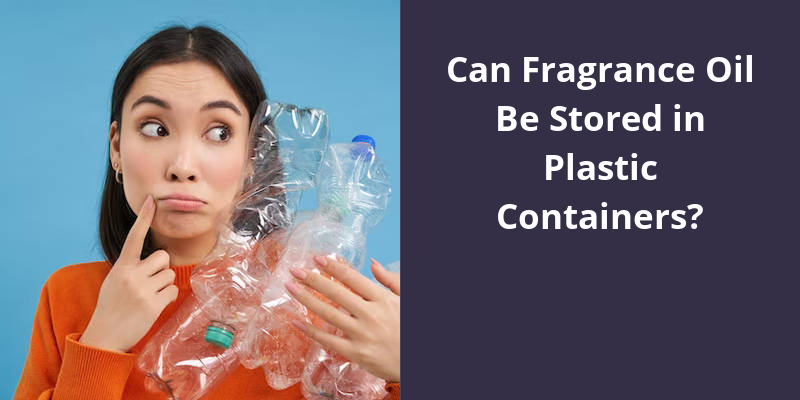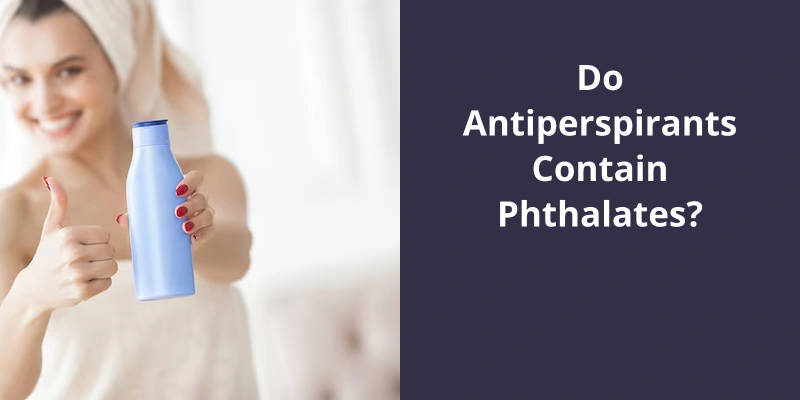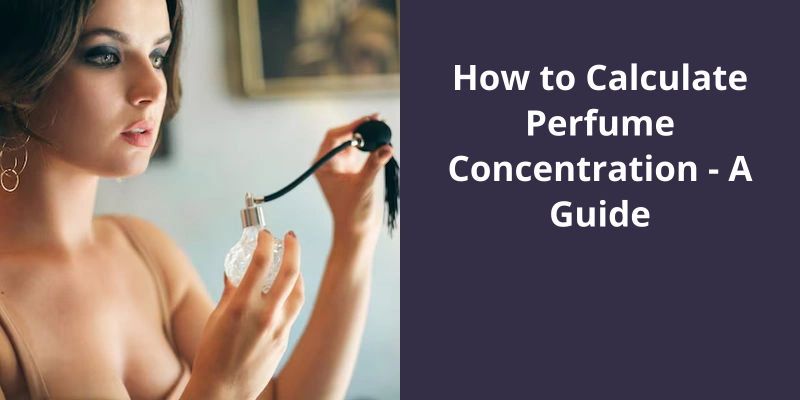When it comes to storing fragrance oil, it’s important to consider the type of container you use. While plastic containers may seem convenient, they may not be the best choice for long-term storage. Fragrance oils have the potential to slowly dissolve the plastic material, causing it to mix with the oil itself. This can compromise the integrity of the fragrance oil and potentially affect it’s scent or quality. To minimize any potential damage, it’s crucial to ensure that the lids of the plastic containers are fastened tightly to minimize exposure to oxygen.

Can You Put Fragrance Oil in a Plastic Cup?
When it comes to storing fragrance oil, the choice of container is of utmost importance. While plastic cups may seem like a convenient option, it isn’t advisable to store undiluted fragrance oil in plastic containers. The reason behind this lies in the chemical composition of fragrance and essential oils, which have the potential to deteriorate certain types of plastics.
Undiluted fragrance and essential oils contain concentrated aromatic compounds that can react with the plastic surface of containers and molds. This can lead to the degradation of the plastic, causing it to break down or leach harmful chemicals into the oil. Not only does this compromise the quality of the fragrance oil, but it can also pose health risks if consumed or applied onto the skin.
To ensure the integrity of your fragrance oil, it’s recommended to store them in glass containers instead. Glass is chemically inert, meaning it doesn’t react with the fragrance oil, ensuring that the quality and purity of the oil remain intact over time. Glass containers also provide a level of protection against light, which can further degrade the fragrance and essential oils.
This is especially beneficial if you’ve a collection of various scents that you need to access quickly. Glass containers are also more durable and resistant to temperature changes, making them a safer option for long-term storage.
The chemical composition of these oils can react with certain types of plastics, compromising their quality and potentially posing health risks.
How Do Temperature Changes Affect the Fragrance and Quality of Fragrance Oil When Stored in Plastic Cups Versus Glass Containers?
- Temperature changes may impact fragrance and quality of fragrance oil when stored in different materials, such as plastic cups and glass containers.
- Plastic cups are more vulnerable to temperature fluctuations as they can expand or contract, causing the scent to degrade.
- Glass containers tend to provide better insulation and maintain a more consistent temperature, thereby preserving the fragrance and quality of the oil.
- Extreme heat can accelerate the oxidation process and cause the fragrance to deteriorate more rapidly in plastic cups.
- Additionally, plastic containers might interact with the fragrance molecules, altering their scent and compromising overall quality.
- It’s advisable to store fragrance oil in glass containers, away from direct sunlight and excessive heat, to prevent any negative effects on fragrance and quality.
- Keep in mind that individual results may vary based on the specific properties of the fragrance oil and the storage conditions.
- Regularly monitoring storage conditions and conducting scent tests can help ensure the fragrance oil’s longevity and optimal performance.
When it comes to storing oil, it’s best to avoid using plastic containers due to the potential leaching of chemicals over time. This leaching can’t only affect the taste of the oil but also pose health risks. Instead, opt for a glass container with a tight lid to ensure the oil remains fresh and free from any potential contaminants.
Should Oil Be Stored in Plastic Containers?
When it comes to storing oil, it’s important to consider the type of container you use. While plastic containers may seem convenient, it’s best to avoid storing oil in them. This is because plastic containers have the tendency to leach chemicals over time, which can ultimately affect the taste and quality of the oil.
Chemicals from the plastic can gradually seep into the oil, compromising it’s integrity and potentially altering it’s flavor. Moreover, these chemicals can also pose health risks if consumed. Therefore, it’s highly recommended to transfer oil from a plastic container to a glass one with a tight lid.
Glass containers aren’t only safer, but they also provide better preservation for oil due to their non-reactive nature. They don’t introduce any foreign chemicals into the contents, ensuring that the oil remains untainted.
A tight-fitting lid is also essential for maintaining the freshness of the oil. It prevents air from entering the container, minimizing oxidation and extending the shelf life of the oil. This is especially crucial for delicate oils, such as fragrant oils, as they can be easily affected by environmental factors and lose their aromatic qualities.
By storing fragrance oil in a glass container with a tight lid, you can rest assured that the oil will maintain it’s original scent and overall quality. It’s a simple and effective way to ensure that your fragrance oils stay fresh and ready for use.
The Importance of Choosing a Non-Reactive Container for Oil Storage
- Prevents chemical reactions: A non-reactive container is essential for oil storage as it prevents any chemical reactions between the oil and the container material. This is crucial because certain container materials can react with oil, leading to changes in the oil’s composition and potentially causing contamination.
- Maintains oil quality: Choosing a non-reactive container helps to maintain the quality of the oil for a longer period. Reactive containers may introduce unwanted flavors, odors, or impurities into the oil, compromising it’s taste, aroma, and overall quality.
- Preserves nutritional value: By utilizing a non-reactive container, you can ensure that the nutritional value of the stored oil remains intact. Reactive containers can leach harmful substances into the oil, potentially damaging it’s nutritional properties.
- Prevents chemical degradation: Certain oils are susceptible to oxidation and degradation when exposed to reactive containers. Opting for a non-reactive container helps to minimize the risk of chemical degradation and preserve the oil’s freshness and shelf life.
- Enhances safety: Choosing a non-reactive container is crucial for safety reasons. Reactive containers may pose a risk of leaks, corrosion, or even rupturing, which can lead to accidents and potentially hazardous situations.
- Complies with food safety standards: It’s essential to select a non-reactive container that meets food safety standards and regulations. This ensures that the stored oil remains free from any harmful substances or contaminants, meeting the requirements for safe consumption.
- Reduces waste and cost: Utilizing a non-reactive container eliminates the need for frequent oil replacements due to contamination or quality deterioration. This reduces waste and minimizes the cost of frequently purchasing new oil supplies.
- Provides versatility: Non-reactive containers are suitable for storing various types of oils, including cooking oils, essential oils, and industrial oils. Their neutral nature allows for versatility in application without the concern of adverse reactions or deteriorating the oil quality.
- Promotes eco-friendly practices: Opting for a non-reactive container is a step towards promoting eco-friendly practices. Choosing materials that are recyclable or reusable reduces environmental impact and contributes to sustainability.
- Ensures peace of mind: By selecting a non-reactive container for oil storage, you can have peace of mind that your oil will remain safe, unaffected, and of high quality until you’re ready to use it, ensuring a positive and consistent experience.
Source: How to store cooking oil? | Purti
However, when it comes to pure or undiluted essential oils, there’s some debate regarding the safety of using plastic containers, particularly those made of PP (polypropylene). While PP containers are generally considered to be safe for storing diluted essential oils, there are concerns that certain compounds in undiluted oils may interact with the plastic material, potentially causing leaching or contamination. Therefore, it’s advised to exercise caution when choosing the right type of container for your essential oils.
Is PP Plastic Safe for Essential Oils?
When it comes to storing essential oils, it’s important to consider the type of plastic container you’re using. Specifically, when using “diluted” essential oils, plastic containers like PET or fluorinated PE or PP containers are known to be safe for storage. PP plastic, also known as polypropylene, is a commonly used type of plastic that’s considered safe for essential oil storage.
It’s known for it’s high melting point, which means it can withstand the heat that may be generated during the production or transportation of essential oils. Additionally, PP plastic is considered non-reactive, which means it doesn’t interact with the essential oils and alter their composition.
PET, or polyethylene terephthalate, is another type of plastic that’s commonly used for storing essential oils. It’s transparent, lightweight, and has good chemical resistance. PET containers are typically used for storing diluted essential oils, as they’re less likely to react with the oils and cause any changes in their properties.
The fluorination process involves treating the plastic with certain chemicals to enhance it’s barrier properties, making it even more resistant to chemical interactions.
This ensures that the containers have been tested and approved for safe use with consumable products and won’t release any harmful substances into the oils.
PET and fluorinated PE or PP containers are also commonly used and offer good chemical resistance.
Conclusion
To maintain the integrity of fragrance oils, it’s imperative to store them in suitable, airtight containers to minimize exposure to oxygen.





